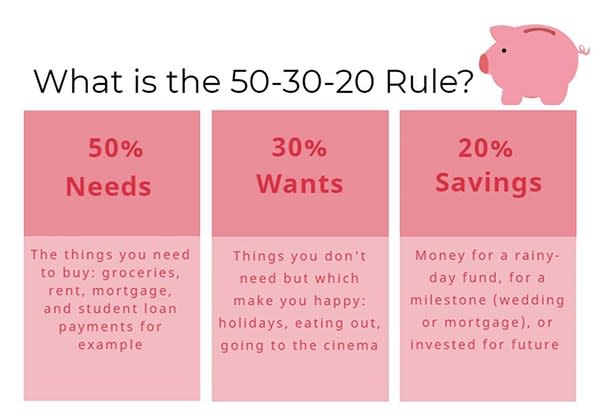How Much Should I be Saving?

We all know we should be saving money each month, but how much is enough?
The amount you put aside on a monthly basis will depend on a number of factors: what you’re saving for, how soon you might need the money, and how much you can afford. Here are some things to think about:
Do you Have Debt?
Saving money is important, but not at the expense of putting yourself in financial difficulty. Paying off credit cards or loans should generally take priority over savings, because the interest rates on this type of debt are typically much higher than the interest you can earn on your savings. A growing debt pile will only wipe out any returns you earn on your savings.
Exceptions to this include lower-cost long-term debt such as a mortgage or student loans.
It’s also worth pointing out that saving doesn’t necessarily mean investing. You might choose to invest the money you set aside in the stock market, if you have the risk appetite and appropriate time horizon, but you could also leave the money in a cash savings account.
With that out the way, let’s get started.
The 50-30-20 Rule
The 50-30-20 rule is a good place to start when thinking about getting into a good savings habit. This approach splits your monthly income into three chunks:
• 50% of your income is for necessities including groceries, monthly bills like your phone, heating or student loan, as well as paying your rent or mortgage.
• 30% is for “wants” – the things you don’t need but which make you happy, whether it's new clothes, eating out or going on holiday.
• 20% is put into savings. This can be money invested into a pension, put into a rainy-day fund or invested in an Isa.
Chunking your money in this way is an easy strategy to manage your finances because it means you know exactly how much you have to spend and to save each month. It also means that you automatically increase the amount you save when your income rises because you are setting aside a percentage of your money rather than a set amount.

What if I Can’t Save That Much?
Most of us have bills to pay, student loans to grapple with and families to feed, and this limits the amount of spare money there is to save each month. In fact, it’s estimated that around 40% of Brits in their twenties have no savings at all.
But the key point is: saving something – anything, however small – is better than saving nothing.
Starting early is more important than saving big. If you saved just £25 a month and increased that amount in line with inflation each year, after 40 years you’d have more than £50,000. As Michael Pe, product manager at Morningstar Canada, points out from his own personal experience, putting off getting started can seriously hurt in the long-run. “It took me years getting comfortable with investing in the stock market but if I had just started five years earlier, my predicted future portfolio value at retirement would be significantly higher than it is now,” he says.
He uses the example of two people who both invest £300 a month until age 60 and achieve returns of 8% a year. Person A gets started at age 30 and Person B procrastinates until age 35. By the time they both turn 60, Person A has £688,000 but Person B has £447,000 – a difference of £241,000!
Emma Morgan, portfolio manager at Morningstar Investment Management, says: “People should absolutely begin saving as soon as possible, no matter how small the contribution is. Compound interest is a very powerful force, even Einstein supposedly referred to it as the 8th Wonder of the World!”
What if I Can Afford to Save More?
That’s great! The 50-30-20 approach is only a guideline, and the 20% savings figure is definitely not a limit. If you can afford to save more then you absolutely should. This is the basic premise behind the FIRE movement, in fact.
FIRE is the idea of “Financial Independence, Retire Early” that has captured the imaginations of people across the globe who are taking the approach of seriously ramping up their savings as early as possible so they can retire younger.
Morgan adds: “Money makes money and the earlier you can get your money making you money the better. Psychologically it will also provide you with a great sense of achievement as you see how much you have saved and watch your money grow over time.”
What are You Saving For?
How much you set aside also depends on what you plan to use the money for. If you need to build an emergency fund, for example, that may take priority over any other type of saving but could be a goal that’s reached relatively quickly. On the other hand, if you’re saving for retirement, you’ll be aiming to amass a much greater amount over a much longer period of time.
Rainy Day Fund
Experts typically advise having at least three months’ salary as a rainy-day fund, and some people may feel more comfortable upping that to six months’ worth of cash. This is money you can access immediately in case the boiler breaks or the car gets a flat tyre – it is for those annoying emergencies that crop up when you least expect.
House Deposit
Saving a deposit for your first home, meanwhile, will be a bigger target that is likely to take longer to reach. The easiest first step here is to determine the size of deposit you need and when you hope to have it and work backwards from there:
If you need £15,000 in three years, you’d need to save around £420 a month if you’re keeping the money in cash with an annual return of 1%. If you’re investing your money in the stock market and hoping to achieve returns of, say, 6% a year then saving £380 a month would get you to your goal.
Retirement
Retirement saving requires a different approach yet again. If you start saving at age 30 you will likely have at least 35 years for compounding to work its magic. However, your end goal here is likely to be significantly larger than any rainy-day fund or house deposit. Still, many workers will receive contributions from their employer, which can help boost their pot.
A 30-year-old who saves £150 a month of their salary and whose employer matches that contribution could retire at age 65 with a respectable pot of more than £414,000 if they achieve annual growth of 5% and grow their contributions each year in line with inflation (at an assumed rate of 1.5%).

 Yahoo Finance
Yahoo Finance 